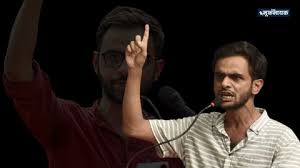Four Years On: The Unfolding Injustice in Umar Khalid's 2020 Delhi Riots Trial
Explore the ongoing controversy and alleged injustice in Umar Khalid’s trial for the 2020 Delhi riots conspiracy case. Discover key events supporting Khalid, the impact of UAPA charges, and the broader implications for civil liberties and democracy. Stay informed with our in-depth analysis of this high-profile case that has sparked international attention.
FEATURED


Four Years of Unjust Trials: Umar Khalid and the 2020 Delhi Riots Conspiracy Case
As the fourth anniversary of the 2020 Delhi riots approaches, Umar Khalid's prolonged legal battle continues to be a focal point of discussion and controversy. Khalid, an activist and former student leader at Jawaharlal Nehru University (JNU), has been embroiled in a high-profile case that many believe epitomizes a grave miscarriage of justice. This blog explores the details of Khalid’s case, the ongoing claims of injustice, and significant events in support of him over the past four years.
A Brief Overview: The 2020 Delhi Riots
In February 2020, Delhi experienced one of its most devastating communal riots in recent history. The violence, which resulted in over 50 deaths and hundreds of injuries, erupted in response to widespread protests against the Citizenship Amendment Act (CAA) and the National Register of Citizens (NRC). The riots not only caused significant loss of life and property but also ignited deep communal tensions across the nation.
Umar Khalid’s Case: Allegations and Charges
Umar Khalid has been accused of orchestrating a conspiracy to incite violence and disrupt communal harmony during the Delhi riots. The prosecution alleges that Khalid and his associates had a premeditated plan to use the riots as a tool to destabilize the government and incite unrest. These charges are under the Unlawful Activities (Prevention) Act (UAPA), a stringent anti-terrorism law known for its controversial application.
Four Years of Alleged Injustice
1. Questionable Evidence and Legal Proceedings: Over the past four years, Khalid’s supporters have argued that the evidence against him remains flimsy and lacks concrete proof. They contend that the legal proceedings are more about political vendetta than seeking justice. The prolonged detention and the slow pace of the trial have been cited as indicative of an unfair legal process.
2. Political Motivations: Many view the case as politically motivated, aimed at suppressing dissent and targeting activists who oppose the government’s policies. Critics argue that the use of UAPA against Khalid reflects a broader pattern of stifling political opposition and curbing civil liberties.
3. Impact on Civil Liberties: The ongoing use of anti-terror laws against Khalid and other activists has raised serious concerns about the erosion of democratic freedoms. Activists and human rights advocates argue that the case sets a dangerous precedent for the suppression of dissent and the abuse of legal mechanisms to target political opponents.
Key Events in Support of Umar Khalid
1. Global Advocacy and Protests: Over the past four years, numerous international human rights organizations, including Amnesty International and Human Rights Watch, have raised concerns about Khalid’s treatment. They argue that the case is emblematic of a trend of using anti-terror laws to suppress dissent.
2. Solidarity from Academic and Activist Circles: Academics, student organizations, and civil society groups have consistently rallied in support of Khalid. Protests, petitions, and public statements from various activists and scholars have highlighted the perceived injustice in his case and called for his release.
3. Legal Challenges and Court Rulings: Khalid’s legal team has mounted significant challenges against the evidence and the procedural aspects of the case. They have argued that the charges are baseless and that the prolonged detention is a misuse of legal provisions.
4. Public Statements and Media Coverage: Prominent public figures and media outlets have continued to shed light on Khalid’s case. Independent journalists and documentarians have produced extensive reports highlighting the disparity between the charges and the actual evidence, further fueling the discourse on the case.
5. Cultural and Artistic Expressions: Various cultural and artistic expressions, including literature, art, and performances, have been used to support Khalid and critique the political and legal system. These expressions serve as a means of raising awareness and mobilizing public opinion.
The Road Ahead: What to Expect
As Umar Khalid’s legal battle continues, the case will likely remain a significant point of contention and debate. The ongoing trial and the broader implications of the case will test India’s commitment to justice, democratic values, and the protection of civil liberties. The coming months will be crucial in determining whether the legal system can address the concerns of injustice and ensure a fair trial for Khalid.
The case against Umar Khalid in the 2020 Delhi riots conspiracy continues to be a symbol of alleged injustice and political contention. As we mark four years of this prolonged legal battle, the broader implications for democratic freedoms and the rule of law remain at the forefront of public discourse. Understanding the complexities and ongoing issues surrounding Khalid’s case is essential for anyone interested in the future of justice and activism in India.
Stay informed with Talk Of Trends for the latest updates and in-depth analysis of this significant story. Your engagement and understanding contribute to the broader conversation on justice and democracy in India.
